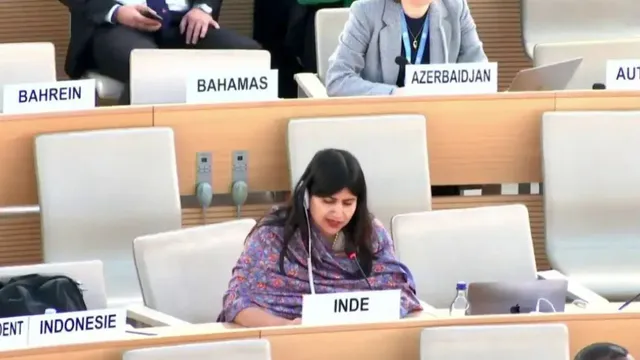- By Supratik Das
- Sat, 20 Sep 2025 08:12 AM (IST)
- Source:JND
India exposes Pakistan at UN: India on Friday launched a sharp counterattack against Pakistan at the United Nations Human Rights Council (UNHRC) in Geneva, accusing Islamabad of politicising the forum by raising the Indus Waters Treaty (IWT) even as it continues to export terror across borders.
Indian diplomat Anupama Singh delivered a strong statement, asserting that Pakistan’s attempts were nothing more than diversionary tactics to mask the “grim reality of relentless state-sponsored terrorism.”
India Hits Back At Pak’s Double Game
Singh reminded the Council that the 1960 treaty was signed in the spirit of goodwill and friendship, but “the world of 1960 is not the world of today.” She underlined that Pakistan’s continuing support for cross-border terrorism “fundamentally erodes the environment required for honouring treaty obligations.” “The Council must not allow itself to be used as a platform for diversion and distortion. It must instead recognise that lasting cooperation is rooted in trust, not terror,” she added, making clear that treaties cannot stand on the foundation of violence and extremism. India’s message was unequivocal, while Pakistan tries to present water as a lifeline, its actions on the ground prove otherwise.
Indian diplomat Anupama Singh brutally exposed Pakistan and Pak sponsored terrorism.
— VAISHNAV 🇮🇳 (@VaishnavSharan7) September 19, 2025
Says, “The World of 1960 is not the world of today” 💀
Pakistan raised the issue of Indus water Treaty abeyance at the UN HR Council in Geneva.#Pakistan #India #UNHCR pic.twitter.com/JEZ2o0wOQC
The statement followed several months after New Delhi suspended its commitment under the Indus Waters Treaty after the April 2025 Pahalgam terror attack, where Pakistan-sponsored militants attacked Indian security personnel.
India's reaction created a new historical trend in its policy, and the government drew a fresh red line, "Blood and water cannot flow together." Islamabad was given a formal note verbale informing it that the decision had been made to keep the treaty suspended. No meetings of the Indus Waters Commissioners, no hydrological data exchange, and no regular treaty obligations will be pursued until Pakistan stops sponsoring terror.
Pakistan’s Claims Countered At Global Stage
Pakistan’s Prime Minister Shehbaz Sharif had recently raised the water-sharing issue at the Shanghai Cooperation Organisation (SCO), attempting to portray it as a humanitarian concern. India countered by exposing what it described as Pakistan’s “double game”—issuing threats of war over water while at the same time providing safe havens and support to terror groups operating against India.
Singh’s remarks at the UNHRC further amplified this position, signalling that India will not allow Pakistan to use international platforms to distract from its own record on terrorism and extremism.
India’s highlighting of the link between terror and treaty obligations reinforces its long-standing stand that dialogue and cooperation cannot proceed in the shadow of violence. As Singh put it bluntly at Geneva, “Lasting cooperation is rooted in trust, not terror.”

